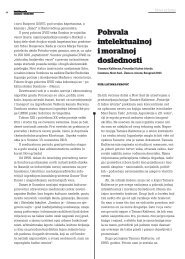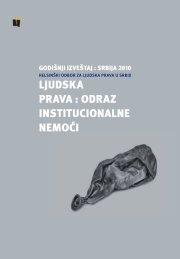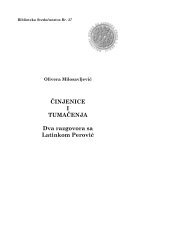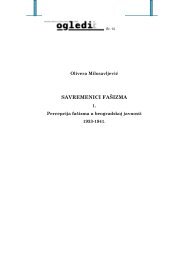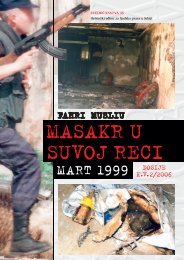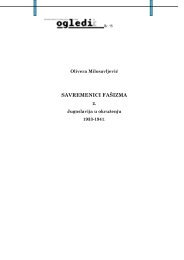Human Rights: Hostage To the State's Regression - Helsinki ...
Human Rights: Hostage To the State's Regression - Helsinki ...
Human Rights: Hostage To the State's Regression - Helsinki ...
Create successful ePaper yourself
Turn your PDF publications into a flip-book with our unique Google optimized e-Paper software.
<strong>Helsinki</strong> Committee for <strong>Human</strong> <strong>Rights</strong> in Serbia<br />
2006: SERBIA COLD-SHOULDERS<br />
THE HAGUE TRIBUNAL<br />
The Attitude towards The Hague Tribunal<br />
and <strong>the</strong> Policy of Memory<br />
Scientific circles are ra<strong>the</strong>r indifferent to <strong>the</strong> recent history and<br />
collective memory and are prone to marginalize <strong>the</strong>m, all of which opens to<br />
door to manipulation of all sorts. The humanistic elite assembled in <strong>the</strong> Serbian<br />
Academy of Arts and Sciences fosters <strong>the</strong> <strong>the</strong>sis about Serbia being a victim of<br />
a worldwide conspiracy. They also nourish <strong>the</strong> memory of <strong>the</strong> World War II by<br />
insisting on genocide committed against <strong>the</strong> Serbs (<strong>the</strong> Jasenovac concentration<br />
camp). Such attitude shapes <strong>the</strong> culture of remembrance manifested at almost<br />
every anniversary marking some major historical event. So, April 6 is<br />
exclusively recalled as <strong>the</strong> day <strong>the</strong> Nazi Germany bombarded Belgrade in 1941,<br />
while April 6 1991 – <strong>the</strong> beginning of <strong>the</strong> Bosnian war – is totally ignored or<br />
bypassed. This approach is fully mirrored in <strong>the</strong> reports on <strong>the</strong> proceedings<br />
conducted in The Hague Tribunal – <strong>the</strong> Trial Chamber’s judgments are<br />
presented to <strong>the</strong> Serbian audience selectively and summarily. The media<br />
coverage of <strong>the</strong> verdict passed by <strong>the</strong> International Court of Justice was<br />
primarily focusing <strong>the</strong> section proclaiming Serbia not guilty of genocide<br />
against Bosniaks. However, <strong>the</strong> topic itself was short-lived – practically<br />
considered hot for a couple of weeks only. Instead, <strong>the</strong> international law is<br />
invoked solely in <strong>the</strong> context of <strong>the</strong> future status of Kosovo. And, for that<br />
matter, Russia’s role is being glorified – for, Russia is expected to veto a new<br />
resolution of <strong>the</strong> UN Security Council.<br />
Co-operation with <strong>the</strong> International Criminal Tribunal for <strong>the</strong> Former<br />
Yugoslavia (<strong>the</strong> Hague Tribunal) represents a double measure of readiness of<br />
Serbia for an essential and comprehensive democratic transition. On <strong>the</strong> one<br />
hand, it demonstrates <strong>the</strong> position of <strong>the</strong> incumbent authorities on <strong>the</strong> legacy<br />
of Slobodan Milosevic and his criminal regime, while on <strong>the</strong> o<strong>the</strong>r hand it<br />
demonstrates its (in) sincere wish for latching on <strong>the</strong> Euro-Atlantic<br />
integrations, of which <strong>the</strong> hand-over of war crimes indictees, primarily of<br />
Ratko Mladic, is one of <strong>the</strong> conditions. Recent behavior of <strong>the</strong> government of<br />
<strong>the</strong> Republic of Serbia makes us draw <strong>the</strong> conclusion that <strong>the</strong> Serb political<br />
<strong>Human</strong> <strong>Rights</strong>: <strong>Hostage</strong> <strong>To</strong> <strong>the</strong> <strong>State's</strong> <strong>Regression</strong><br />
elite has problems with both sides of <strong>the</strong> aforementioned measure. In o<strong>the</strong>r<br />
words in <strong>the</strong> year 2006, not a single war crimes indictee from Serbia was<br />
handed-over to <strong>the</strong> Hague, though <strong>the</strong> government representatives kept<br />
promising those handovers during <strong>the</strong>ir meetings with international officials<br />
and <strong>the</strong> Tribunal’s chief prosecutor Carla de Ponte. It became manifest that<br />
Kostunica-led government was, on <strong>the</strong> one hand, not willing to arrest <strong>the</strong><br />
indictees (during his three-year long tenure to <strong>the</strong> Hague Tribunal were<br />
handed over only those war crimes indictees who had previously agreed to socalled<br />
voluntary surrender), while, on <strong>the</strong> o<strong>the</strong>r hand, he was ready to pay a<br />
very high price for such lack of co-operation-namely <strong>the</strong> early May suspension<br />
of negotiations on association and stabilization with <strong>the</strong> EU.<br />
Staging of <strong>the</strong> para-state funeral of Slobodan Milošević, who in early<br />
March died in <strong>the</strong> Scheveningen prison, is also an important indicator of<br />
ambivalence of <strong>the</strong> Serb political class on <strong>the</strong> recent past. Death of Slobodan<br />
Milošević and <strong>the</strong> suicide of Milan Babić, also in <strong>the</strong> Sheveningen, have<br />
additionally burdened co-operation with <strong>the</strong> Hague Tribunal, in parallel<br />
providing <strong>the</strong> state-engineered propaganda with additional arguments about<br />
<strong>the</strong> anti-Serb character of <strong>the</strong> International Criminal Court for Former<br />
Yugoslavia.<br />
Throughout 2006 <strong>the</strong> government of Serbia in all possible ways<br />
avoided concrete co-operation with <strong>the</strong> International Criminal Court for<br />
Former Yugoslavia. The most wanted indictee, Ratko Mladić, Commander-in-<br />
Chief of <strong>the</strong> Army of Republika Srpska is still at large as are some o<strong>the</strong>r Hague<br />
indictees, notably Radovan Karadzic. Non-fulfillment of <strong>the</strong> international<br />
commitment relating to mandatory co-operation with <strong>the</strong> Hague Tribunal was<br />
also manifest in procrastinated forwarding of <strong>the</strong> Yugoslav Army documents<br />
to <strong>the</strong> ICTY. Since April 2005 hand-over of <strong>the</strong> last of 10 “volunteers”, war<br />
crimes indictees, <strong>the</strong> Serb authorities by <strong>the</strong> end of 2006 have not apprehended<br />
or handed over any o<strong>the</strong>r indictee.<br />
Official Belgrade tried to ease up strong pressures from <strong>the</strong> EU and<br />
<strong>the</strong> US to apprehend and hand-over Mladic by adopting so-called Action Plan<br />
for Co-operation with <strong>the</strong> Hague Tribunal on so-called “Croat model”. That plan<br />
in fact aimed at covering up <strong>the</strong> factual severance of co-operation with The<br />
Hague Tribunal and absence of a genuine political will for a serious search for,<br />
location and arrest of Mladic. After listening for months about <strong>the</strong> Serb<br />
government readiness to arrest Mladic, <strong>the</strong> promise which even<br />
representatives of <strong>the</strong> international community as well as <strong>the</strong> ICTY’s chief<br />
prosecutor Carla del Ponte were ready in early 2006 to place faith in, in midyear,<br />
<strong>the</strong> European Union decided to respond more firmly, namely on 3 May it<br />
suspended negotiations with Serbia on stabilization and association.<br />
Just two months earlier, in March 2006, Prime Minister Vojislav<br />
Kostunica stated that co-operation with <strong>the</strong> Hague Tribunal was <strong>the</strong> country’s<br />
priority or primary interest. In his front-page Politika interview related to <strong>the</strong><br />
82<br />
83



